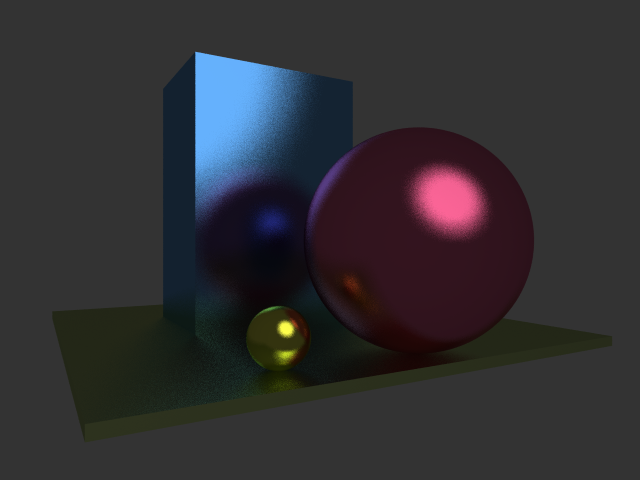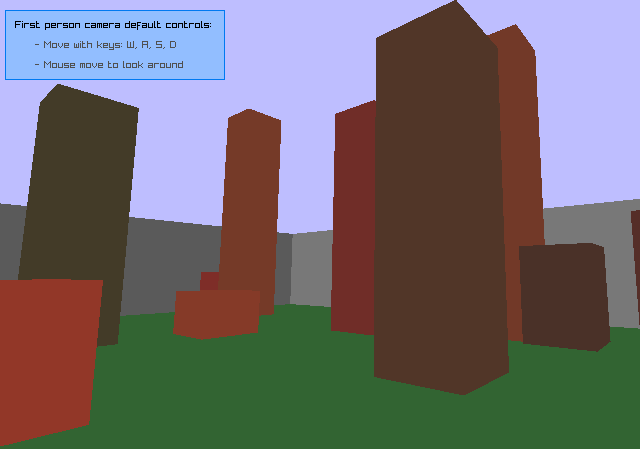Welcome to Umka!
Umka is a statically typed embeddable scripting language. It combines the simplicity and flexibility needed for scripting with a compile-time protection against type errors. Its aim is to follow the Python Zen principle Explicit is better than implicit more consistently than dynamically typed languages generally do.
Features
- Clean syntax inspired by Go
- Cross-platform bytecode compiler and virtual machine
- Garbage collection
- Polymorphism via interfaces
- Multitasking based on fibers
- Type inference
- Distribution as a dynamic library with a simple C API
- C99 source
Performance
Due to the efficient for loop implementation and support for static data structures, Umka demonstrates high performance in multidimensional array operations and similar tasks.
400 x 400 matrix multiplication (AMD A4-3300M @ 1.9 GHz, Windows 7)

Getting Started
- Download the latest release for Windows and Linux
- Take a tour of Umka
- Read the language specification
- Explore the raytracer example that demonstrates many language features like fibers, interfaces and dynamic arrays
- Play with the toy Lisp interpreter written in Umka
- Try the more realistic C+Umka embedded scripting example (Note: raylib is required to compile and run it)
- If you are familiar with Go, read about the differences
- Look at the language grammar to better understand Umka capabilities
Raytracer example
C+Umka 3D camera example
A Tour of Umka
Hello
fn main() {
printf("Hello Umka!\n")
}
Declarations
Constants
const a = 3
const b* = 2.38 // Exported identifier
const (
c = sin(b) / 5
d = "Hello" + " World"
)
Types
type IntPtr = ^uint16 // Pointer
type Arr = [a]real // Array
type (
DynArr = [][5]int // Dynamic array
String = str // String
Quat = struct { // Structure
q: [4]real
normalized: bool
}
Printable = interface { // Interface
print(): int
}
ErrFn = fn(code: int) // Function
)
Variables
var e: int
var f: String = d + "!"
var (
g: Arr = [3]real{2.3, -4.1 / 2, b}
h: DynArr
)
q := Quat{q: [4]real{1, 0, 0, 0}, normalized: true}
Functions
fn tan(x: real): real {return sin(x) / cos(x)}
fn getValue(): (int, bool) {return 42, true}
Methods
fn (a: ^Arr) print(): int {
printf("Arr: %s\n", repr(a^))
return 0
}
Statements
Assignment
h = make([][5]int, 3) // Dynamic arrays are initialized with make()
Declaration via assignment (with type inference)
sum := 0.0
Function call
y := tan(30 * std.pi / 180)
h = append(h, [5]int{10, 20, 30, 40, 50})
h = delete(h, 1)
Method call
g.print()
Conditional
if x, ok := getValue(); ok {
std.println("Got " + repr(x))
}
Switch
switch a {
case 1, 3, 5, 7: std.println(std.itoa(a) + " is odd")
case 2, 4, 6, 8: std.println(std.itoa(a) + " is even")
default: std.println("I don't know")
}
Loop
for k := 1; k <= 128; k *= 2 {
std.println(repr(k))
}
for i, x in g {
if fabs(x) > 1e12 {break}
if x < 0 {continue}
sum += x
}
Multitasking
fn childFunc(parent: ^fiber, buf: ^int) {
for i := 0; i < 5; i++ {
std.println("Child : i=" + std.itoa(i) + " buf=" + std.itoa(buf^))
buf^ = i * 3
fibercall(parent)
}
}
fn parentFunc() {
a := 0
child := fiberspawn(childFunc, &a)
for i := 0; i < 10; i++ {
std.println("Parent: i=" + std.itoa(i) + " buf=" + std.itoa(a))
a = i * 7
if fiberalive(child) {
fibercall(child)
}
}
}
Functional tools
import "../import/fnc.um"
fn main() {
var data: fnc.AnyArray = [6]fnc.Any{3, 7, 1, -4, 2, 5}
printf("Array = %s\n", repr(data))
sqr := fn (x, ctx: fnc.Any): fnc.Any {p := ^int(x); return p^ * p^}
less := fn (x, ctx: fnc.Any): bool {p := ^int(x); q := ^int(ctx); return p^ < q^}
sum := fn (x, y, ctx: fnc.Any): fnc.Any {p := ^int(x); q := ^int(y); return p^ + q^}
const max = 30
result := data.map(sqr, null).filter(less, max).reduce(sum, null)
printf("Sum of all squares less than %d = %s\n", max, repr(result))
}
Umka vs Go
Purpose
While Go is a compiled systems programming language with a complex runtime library and big output binaries, Umka is a scripting language with a lightweight interpreter that can be easily embedded into any application as a shared library.
Syntax
Umka is very similar to Go syntactically. However, in some aspects it's different. It has shorter keywords: fn for func, str for string, in for range. For better readability, it requires a : between variable names and type in declarations. It doesn't follow the unfortunate C tradition of pointer dereferencing. Instead of *p, it uses the Pascal syntax p^. As the * character is no longer used for pointers, it becomes the export mark, like in Oberon, so that a programmer can freely use upper/lower case letters in identifiers according to his/her own style. Type assertions don't have any special syntax; they look like pointer type casts.
Semantics
Umka allows implicit type casts and supports default parameters in function declarations. It doesn't have slices. Instead, it supports dynamic arrays, which are declared like Go's slices and initialized by calling make(). Method receivers must be pointers. The multithreading model in Umka is inspired by Lua and Wren rather than Go. It offers lightweight threads called fibers instead of goroutines and channels. The garbage collection mechanism is based on reference counting, so Umka needs to support weak pointers. Maps, closures and Unicode support are under development.


